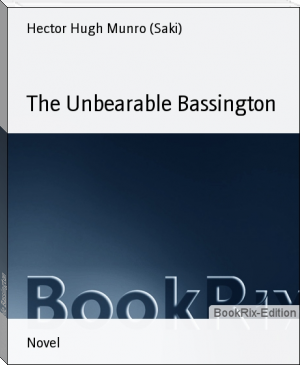When William Came by Hector Hugh Munro (Saki) (top books to read .TXT) 📖

- Author: Hector Hugh Munro (Saki)
Book online «When William Came by Hector Hugh Munro (Saki) (top books to read .TXT) 📖». Author Hector Hugh Munro (Saki)
Yeovil was silent for a moment or two, then he asked:
"And the sequel, the peace?"
"The collapse was so complete that I fancy even the enemy were hardly prepared for the consequences of their victory. No one had quite realised what one disastrous campaign would mean for an island nation with a closely packed population. The conquerors were in a position to dictate what terms they pleased, and it was not wonderful that their ideas of aggrandisement expanded in the hour of intoxication. There was no European combination ready to say them nay, and certainly no one Power was going to be rash enough to step in to contest the terms of the treaty that they imposed on the conquered. Annexation had probably never been a dream before the war; after the war it suddenly became temptingly practical. Warum nicht? became the theme of leader-writers in the German press; they pointed out that Britain, defeated and humiliated, but with enormous powers of recuperation, would be a dangerous and inevitable enemy for the Germany of to-morrow, while Britain incorporated within the Hohenzollern Empire would merely be a disaffected province, without a navy to make its disaffection a serious menace, and with great tax-paying capabilities, which would be available for relieving the burdens of the other Imperial States. Wherefore, why not annex? The warum nicht? party prevailed. Our King, as you know, retired with his Court to Delhi, as Emperor in the East, with most of his overseas dominions still subject to his sway. The British Isles came under the German Crown as a Reichsland, a sort of Alsace-Lorraine washed by the North Sea instead of the Rhine. We still retain our Parliament, but it is a clipped and pruned-down shadow of its former self, with most of its functions in abeyance; when the elections were held it was difficult to get decent candidates to come forward or to get people to vote. It makes one smile bitterly to think that a year or two ago we were seriously squabbling as to who should have votes. And, of course, the old party divisions have more or less crumbled away. The Liberals naturally are under the blackest of clouds, for having steered the country to disaster, though to do them justice it was no more their fault than the fault of any other party. In a democracy such as ours was the Government of the day must more or less reflect the ideas and temperament of the nation in all vital matters, and the British nation in those days could not have been persuaded of the urgent need for military apprenticeship or of the deadly nature of its danger. It was willing now and then to be half-frightened and to have half-measures, or, one might better say, quarter-measures taken to reassure it, and the governments of the day were willing to take them, but any political party or group of statesmen that had said 'the danger is enormous and immediate, the sacrifices and burdens must be enormous and immediate,' would have met with certain defeat at the polls. Still, of course, the Liberals, as the party that had held office for nearly a decade, incurred the odium of a people maddened by defeat and humiliation; one Minister, who had had less responsibility for military organisation than perhaps any of them, was attacked and nearly killed at Newcastle, another was hiding for three days on Exmoor, and escaped in disguise."
"And the Conservatives?"
"They are also under eclipse, but it is more or less voluntary in their case. For generations they had taken their stand as supporters of Throne and Constitution, and when they suddenly found the Constitution gone and the Throne filled by an alien dynasty, their political orientation had vanished. They are in much the same position as the Jacobites occupied after the Hanoverian accession. Many of the leading Tory families have emigrated to the British lands beyond the seas, others are shut up in their country houses, retrenching their expenses, selling their acres, and investing their money abroad. The Labour faction, again, are almost in as bad odour as the Liberals, because of having hob-nobbed too effusively and ostentatiously with the German democratic parties on the eve of the war, exploiting an evangel of universal brotherhood which did not blunt a single Teuton bayonet when the hour came. I suppose in time party divisions will reassert themselves in some form or other; there will be a Socialist Party, and the mercantile and manufacturing interests will evolve a sort of bourgeoise party, and the different religious bodies will try to get themselves represented - "
Yeovil made a movement of impatience.
"All these things that you forecast," he said, "must take time, considerable time; is this nightmare, then, to go on for ever?"
"It is not a nightmare, unfortunately," said the doctor, "it is a reality."
"But, surely - a nation such as ours, a virile, highly-civilised nation with an age-long tradition of mastery behind it, cannot be held under for ever by a few thousand bayonets and machine guns. We must surely rise up one day and drive them out."
"Dear man," said the doctor, "we might, of course, at some given moment overpower the garrison that is maintained here, and seize the forts, and perhaps we might be able to mine the harbours; what then? In a fortnight or so we could be starved into unconditional submission. Remember, all the advantages of isolated position that told in our favour while we had the sea dominion, tell against us now that the sea dominion is in other hands. The enemy would not need to mobilise a single army corps or to bring a single battleship into action; a fleet of nimble cruisers and destroyers circling round our coasts would be sufficient to shut out our food supplies."
"Are you trying to tell me that this is a final overthrow?" said Yeovil in a shaking voice; "are we to remain a subject race like the Poles?"
"Let us hope for a better fate," said the doctor. "Our opportunity may come if the Master Power is ever involved in an unsuccessful naval war with some other nation, or perhaps in some time of European crisis, when everything hung in the balance, our latent hostility might have to be squared by a concession of independence. That is what we have to hope for and watch for. On the other hand, the conquerors have to count on time and tact to weaken and finally obliterate the old feelings of nationality; the middle-aged of to-day will grow old and acquiescent in the changed state of things; the young generations will grow up never having known anything different. It's a far cry to Delhi, as the old Indian proverb says, and the strange half-European, half-Asiatic Court out there will seem more and more a thing exotic and unreal. 'The King across the water' was a rallying-cry once upon a time in our history, but a king on the further side of the Indian Ocean is a shadowy competitor for one who alternates between Potsdam and Windsor."
"I want you to tell me everything," said Yeovil, after another pause; "tell me, Holham, how far has this obliterating process of 'time and tact' gone? It seems to be pretty fairly started already. I bought a newspaper as soon as I landed, and I read it in the train coming up. I read things that puzzled and disgusted me. There were announcements of concerts and plays and first-nights and private views; there were even small dances. There were advertisements of house-boats and week-end cottages and string bands for garden parties. It struck me that it was rather like merrymaking with a dead body lying in the house."
"Yeovil," said the doctor, "you must bear in mind two things. First, the necessity for the life of the country going on as if nothing had happened. It is true that many thousands of our working men and women have emigrated and thousands of our upper and middle class too; they were the people who were not tied down by business, or who could afford to cut those ties. But those represent comparatively a few out of the many. The great businesses and the small businesses must go on, people must be fed and clothed and housed and medically treated, and their thousand-and-one wants and necessities supplied. Look at me, for instance; however much I loathe coming under a foreign domination and paying taxes to an alien government, I can't abandon my practice and my patients, and set up anew in Toronto or Allahabad, and if I could, some other doctor would have to take my place here. I or that other doctor must have our servants and motors and food and furniture and newspapers, even our sport. The golf links and the hunting field have been well-nigh deserted since the war, but they are beginning to get back their votaries because out-door sport has become a necessity, and a very rational necessity, with numbers of men who have to work otherwise under unnatural and exacting conditions. That is one factor of the situation. The other affects London more especially, but through London it influences the rest of the country to a certain extent. You will see around you here much that will strike you as indications of heartless indifference to the calamity that has befallen our nation. Well, you must remember that many things in modern life, especially in the big cities, are not national but international. In the world of music and art and the drama, for instance, the foreign names are legion, they confront you at
 Have you ever thought about what fiction is? Probably, such a question may seem surprising: and so everything is clear. Every person throughout his life has to repeatedly create the works he needs for specific purposes - statements, autobiographies, dictations - using not gypsum or clay, not musical notes, not paints, but just a word. At the same time, almost every person will be very surprised if he is told that he thereby created a work of fiction, which is very different from visual art, music and sculpture making. However, everyone understands that a student's essay or dictation is fundamentally different from novels, short stories, news that are created by professional writers. In the works of professionals there is the most important difference - excogitation. But, oddly enough, in a school literature course, you don’t realize the full power of fiction. So using our website in your free time discover fiction for yourself.
Have you ever thought about what fiction is? Probably, such a question may seem surprising: and so everything is clear. Every person throughout his life has to repeatedly create the works he needs for specific purposes - statements, autobiographies, dictations - using not gypsum or clay, not musical notes, not paints, but just a word. At the same time, almost every person will be very surprised if he is told that he thereby created a work of fiction, which is very different from visual art, music and sculpture making. However, everyone understands that a student's essay or dictation is fundamentally different from novels, short stories, news that are created by professional writers. In the works of professionals there is the most important difference - excogitation. But, oddly enough, in a school literature course, you don’t realize the full power of fiction. So using our website in your free time discover fiction for yourself. 




Comments (0)